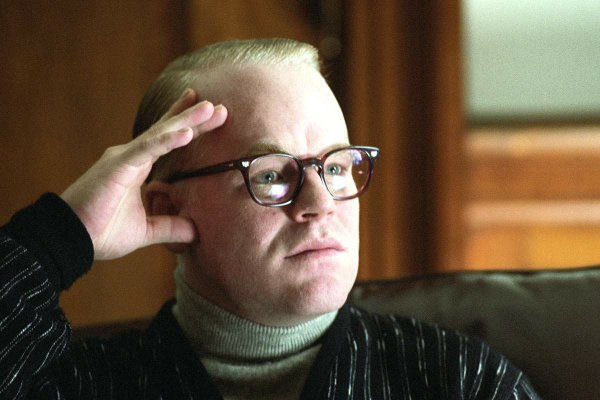Movie review by Greg Carlson
A well-crafted reexamination of “In Cold Blood,” Bennett Miller’s film “Capote” offers viewers a behind-the-scenes tour of the famous writer’s more than half-decade obsession with chronicling a quadruple murder. Already familiar to millions of readers, Truman Capote’s chilling account of the November, 1959 slayings of Herbert, Bonnie, Nancy, and Kenyon Clutter remains one of the most celebrated examples of the “non-fiction novel.” “Capote” manages to do a number of things, but its focus remains on the chronology of events leading from Capote’s initial interest in the story to the execution of convicted murderers Dick Hickock and Perry Smith.
Playing the title character in a tour-de-force performance, Philip Seymour Hoffman ably proves yet again his status as one of cinema’s most interesting actors. Capote’s otherworldly voice, carefully cultivated mannerisms, and bottomless narcissism would be more than enough to trip up many seasoned veterans, but Hoffman is utterly convincing in the role. Accompanied by childhood friend Harper Lee (Catherine Keener), Capote travels to Kansas and manages to gain unprecedented access to local law enforcement officials as well as to the killers themselves. Dan Futterman’s screenplay mostly sidesteps any resentment Capote faced from Holcomb residents, preferring instead to lob a few jokes about the well-appointed scribe’s natty attire.
As the appeal process winds its way through the court system, Capote bonds with Smith (an excellent Clifton Collins Jr.), knowing full well that the success of “In Cold Blood” essentially depends on the young man’s execution. Some audience members are sure to recoil at Capote’s calculating relationship with the assailants, but one of the film’s strengths is the haunting – even chilling – manner in which Capote’s vanity and arrogance trumps any shred of compassion until it is too late. “Capote” tries out the idea that “In Cold Blood” ruined its author (certainly not the first account to do so), and it is easy to see the tug of war between Capote’s desire to be a serious writer and his addiction to the spotlight.
Despite the movie’s reasonably short running time, Miller’s pace occasionally slackens, and a hunger for engagement sets in. This is not to say that “Capote” is ever dull, but given its preoccupation with Capote’s self-devotion, one wishes the movie might have made a little more room for some of the other supporting players. Chris Cooper fades to virtual cameo status as lawman Alvin Dewey, and Bruce Greenwood’s turn as Capote’s longtime companion Jack Dunphy is left undeveloped – a shame on both counts given the skills of these two actors.
The movie’s central relationship (barring the one that Capote has with himself) exists between the author and the slayer. Even at the time of “In Cold Blood’s” publication, Capote’s detractors suggested that he loved Smith, and the movie version carefully compares and contrasts the two men. In one nicely delivered line, Capote even suggests that he and Smith might have grown up in the same house. It’s a wistful thought, but in the end, Capote’s aspiration to have a hit book outweighs any personal connection between the toast of New York’s literary scene and a convicted killer awaiting the gallows.
